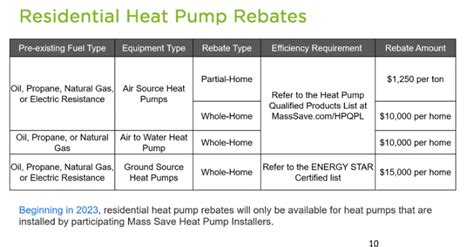Unlock Savings: Everything You Need to Know About 2025 Heat Pump Rebates
As the world shifts toward more sustainable energy solutions, heat pumps have emerged as a key player in residential heating and cooling systems. With advancements in technology and growing awareness of climate change, the demand for heat pumps has increased significantly. In 2025, various rebates and incentives will be available to homeowners looking to upgrade their HVAC systems. This article discusses everything you need to know about the 2025 heat pump rebates, including eligibility, benefits, and how you can take advantage of these savings.
What is a Heat Pump?
A heat pump is an energy-efficient system that can both heat and cool a home. It transfers heat from the outside air or ground into your home during winter and reverses the process in summer. Heat pumps are recognized for their efficiency, as they can significantly reduce energy consumption compared to traditional heating methods.
Types of Heat Pumps
There are several types of heat pumps available, each suited to different climates and home structures:
- Air Source Heat Pumps: These are the most common and transfer heat between your home and the outdoor air.
- Ground Source Heat Pumps (Geothermal): These systems utilize the stable temperatures found underground to provide heating and cooling.
- Water Source Heat Pumps: These pumps extract heat from bodies of water, such as lakes or ponds, making them efficient in locations near water sources.
Why Consider Upgrading to a Heat Pump?
Upgrading to a heat pump comes with several benefits, including:
- Energy Efficiency: Heat pumps can reduce energy bills by 30-40% due to their efficient energy usage.
- Environmental Benefits: By using renewable energy sources, heat pumps contribute to lower greenhouse gas emissions.
- Dual Functionality: Using one system for both heating and cooling simplifies home climate control.
- Long Lifespan: Heat pumps generally have a longer operational life compared to traditional HVAC systems.
2025 Heat Pump Rebates Overview
The 2025 heat pump rebates are designed to encourage homeowners to make the switch to this efficient technology. These incentives can help offset the initial installation costs, making it more financially feasible to upgrade. Here’s what you should know:
Eligibility Criteria
To qualify for the rebates, homeowners typically need to meet certain criteria:
- Residency: Homeowners must reside in specific states where the rebates are offered.
- Type of Installation: The installation must meet the guidelines set forth by energy efficiency programs.
- Approved Contractors: Homeowners may be required to use contractors listed on a state-approved list to ensure quality and compliance.
How Much Can You Save?
The amount of savings can vary widely depending on location and type of heat pump installed. Some incentives may cover a percentage of installation costs, while others may offer fixed dollar amounts. Estimates suggest that savings can range from $1,000 to $3,000, depending on the specifics of the project.
Application Process
To apply for the rebates, homeowners typically need to follow these general steps:
- Research available rebates in your area through state or local energy websites.
- Schedule a consultation with an approved contractor to assess your home and discuss options.
- Complete the installation of the heat pump with the contractor.
- Submit the required documentation, including receipts and proof of installation, to the respective energy office.
Financial Incentives Beyond Rebates
In addition to rebates, homeowners should explore other financial incentives such as:
- Federal Tax Credits: Homeowners can often take advantage of tax credits on energy-efficient systems, further reducing costs.
- State Programs: Some states have additional funding or programs available for energy-efficient home upgrades.
- Utility Company Rebates: Many utility companies offer their own incentives for energy-efficient systems to promote sustainability.
Conclusion
The 2025 heat pump rebates present an excellent opportunity for homeowners to upgrade their heating and cooling systems while also contributing to a more sustainable future. With a range of benefits, including energy savings and positive environmental impacts, investing in a heat pump is likely to pay off in the long run. Always consult with local energy officials and accredited contractors to ensure you meet the requirements and can maximize your savings.
Frequently Asked Questions (FAQs)
1. Are heat pumps effective in cold climates?
Yes, modern heat pumps are designed to perform efficiently even in colder temperatures. However, in extremely cold areas, a supplemental heating source may be necessary.
2. Can I install a heat pump myself?
While some components may be manageable for a DIY enthusiast, it is strongly recommended to hire a professional installation contractor to ensure compliance with safety and efficiency standards.
3. How long does it take to receive the rebate after application?
The time it takes to process rebate applications can vary, but typically it may take anywhere from a few weeks to a few months. It’s advisable to keep track of your application status.
4. What if my home doesn’t qualify for the rebate?
If your home doesn’t qualify, check for other local or federal energy efficiency programs that might be available to you. Various incentives can help improve your home’s efficiency even if rebates for heat pumps are not applicable.
5. How do heat pumps compare to traditional HVAC systems?
Heat pumps are generally more energy-efficient than traditional HVAC systems because they transfer heat instead of generating it, resulting in lower energy costs and fewer emissions.
This HTML formatted article provides comprehensive information about the 2025 heat pump rebates while adhering to your specifications.
Download Heat Pump Rebates 2025
